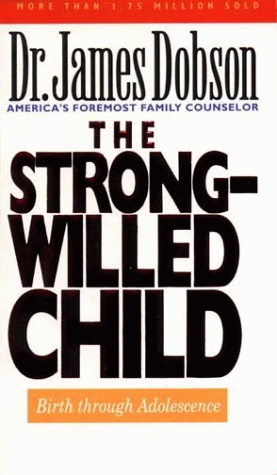James Dobson: Dog Abuser
By Chris Dugan
April 2000

James Dobson: Dog Abuser
By Chris Dugan
April 2000

In his best-selling book, "The Strong-Willed
Child," child-rearing author James Dobson describes how he abused his family's
pet dachshund, Siggie:
"Please don't misunderstand me. Siggie is a member of our family and we love him dearly. And despite his anarchistic nature, I have finally taught him to obey a few simple commands. However, we had some classic battles before he reluctantly yielded to my authority. "At eleven o'clock that night, I told Siggie to go get into his bed, which is a permanent enclosure in the family room. For six years I had given him that order at the end of each day, and for six years Siggie had obeyed. "On this occasion, however, he refused to budge. You see, he was in the bathroom, seated comfortably on the furry lid of the toilet seat. That is his favorite spot in the house, because it allows him to bask in the warmth of a nearby electric heater..."
"When I told Sigmund to leave his warm seat and go to bed, he flattened his ears and slowly turned his head toward me. He deliberately braced himself by placing one paw on the edge of the furry lid, then hunched his shoulders, raised his lips to reveal the molars on both sides, and uttered his most threatening growl. That was Siggie's way of saying. "Get lost!"
"What developed next is impossible to describe. That tiny dog and I had the most vicious fight ever staged between man and beast. I fought him up one wall and down the other, with both of us scratching and clawing and growling and swinging the belt. I am embarrassed by the memory of the entire scene. Inch by inch I moved him toward the family room and his bed. As a final desperate maneuver, Siggie backed into the corner for one last snarling stand. I eventually got him to bed, only because I outweighed him 200 to 12!"
Just in case the more slow-witted
among his readers fail to grasp the obvious parallel between his relationship
with his dog and the type of parenting advice the man as become rich and
famous by dispensing, Dobson then lays it explicitly on the line:
"But this is not a book about the discipline of dogs; there is an important moral to my story that is highly relevant to the world of children. Just as surely as a dog will occasionally challenge the authority of his leaders, so will a little child -- only more so." (emphasis Dobson's)
Dobson even views some crying babies
as "little dictators" engaged in a bid to control and enslave their parents,
and advises parents not to let the child "win" by picking up the child
and soothing it. He warns that:
"[I]t is possible to create a fussy, demanding baby by rushing to pick him up every time he utters a whimper or sigh. Infants are fully capable of learning to manipulate their parents through a process called reinforcement, whereby any behavior that produces a pleasant result will tend to recur. Thus, a healthy baby can keep his mother hopping around his nursery twelve hours a day (or night) by simply forcing air past his sandpaper larynx."
Dobson's parenting style CREATES
the sorts of problems for which he then claims to offer the only solution.
He bullies children, and when they resist his oppressive, degrading treatment,
he uses their "defiance" to further justify his behavior. He sees
the family as "a heirarchy of strength" in which the one with the greatest
physical might and the strongest will prevails. His books are full
of military metaphors in which children "marshall their forces," and "launch"
every "weapon" in their "arsenals," while parents are advised to
"draw a line in the sand" and to "win and win decisively" whenever a child
"sticks their big hairy toe over the line" because "the child has made
it clear that he is looking for a fight and his parents would be wise not
to disappoint him." In fact, it is Dobson himself who starts out
looking for a fight by his dysfunctional need for total control, (even
to the point of dictating precisely where and when his dog sleeps at night).
Yet, whenever his children can't stand it anymore and mount a valiant,
hopeless bid to resist his domestic tyranny, he blames it on the children,
claiming that:
"Perhaps this tendency toward self-will is the essence of 'original sin' which has infiltrated the human family. It certainly explains why I place such stress on the proper response to willful defiance during childhood, for that rebellion can plant the seeds of personal disaster."
Dobson uses the same weapons which
third world dictators utilize to break the wills of pro-democracy dissidents:
pain and fear. The major difference is that when dictators torture
and intimidate anyone who resists THEIR tyranny, THEY don't claim to be
doing it for their victims' own good as an act of love. Dictators
inflict pain and instill fear because doing so meets THEIR needs.
So does James Dobson.
|